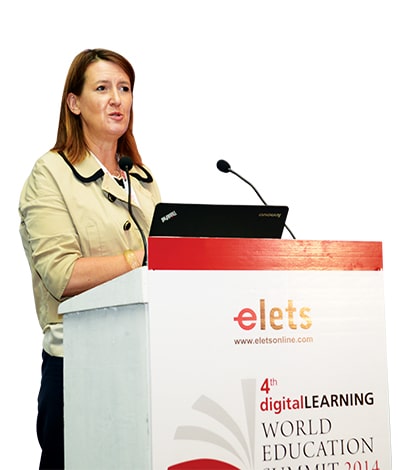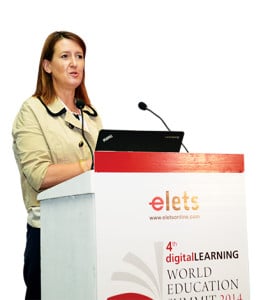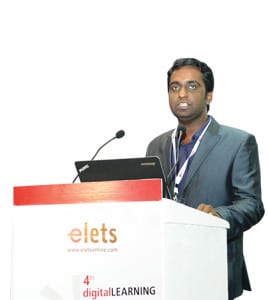
An eminent panel of government and academic luminaries got together at the World Education Summit 2014 to brainstorm the way ahead for education in India. From access and quality of education to the importance of technology enabled learning, the thought leaders’ panel set the tone for extensive deliberations that were to follow at the summit in the next two days

India boasts of being the largest higher education sector in the world. It has around 610 universities set up under the state and central legislation, and around 36,000 colleges are affiliated to these universities. Under these circumstances, it is nothing short of an irony that the Gross Enrollment Ratio (GER) at the higher education level is just 15 per cent, much lower than the world average of 26 per cent. The fundamental problem faced by the Indian education sector as a whole is lack of suitably qualified and appropriately trained teachers in adequate numbers. Apart from access to education, which has also been an issue that is now being addressed partially with the rise in the number of schools and private universities, there is also a need of technology enabled learning to keep it abreast with the developments globally and also keep education relevant to today’s techsavvy generation. It was with this view that the ‘Thought Leaders Panel’ at the World Education Summit (WES) 2014 got together to discuss their views and discuss the way forward to enrich the education sector in India and ensure quality education.
Speaking about the initiatives taken by the government in this regard, Praveen Prakash, Joint Secretary, Technology Enabled Learning, Department of Higher Education, Union Ministry of Human Resource Development (MHRD) said, “There is a renewed focus on im parting technology-enabled education which is as important as other disciplines of education. To ensure that technology enabled learning takes centre stage, the mission of education through ICT needs to be carried out by everyone – government-run institutions, private institutions, state institutions, companies, NGOs, voluntary institutions and the media as well,” he said. The outcome of these initiatives needs to be such that ensures quality education.
Quality of education should be such that it prepares and moulds the students with skills that make them employable. In this dynamic world, the expectations of the employers, either state or private, are also changing. It is important that these expectations are incorporated in the teaching learning process. The problems that India faces with regard to higher education are common to other developing nations as well. Talking about the problem of employment in Sri Lanka, Vishakha Nayanakara, representative of the Ministry of Higher Education, Sri Lanka said, “In an employability census done in Sri Lanka, it was observed that out of every 100 graduates that it produces, 76 are unemployed. So, one of the main objectives of the Sri Lanka higher education ministry is to ensure that we do provide outcome-based education at the universities. Identifying the graduates that we need to produce, identifying the attributes that should be in those graduates, we try to develop the curricula and make sure that the teaching learning processes and assessments map the outcome,” she said. Stressing on the importance of private partnership in fuelling the growth of the education sector, Vishakha said, “Sri Lanka did not have a full-fledged private participation in higher education. But the government is now encouraging transnational education allowing private players to have branch campuses in Sri Lanka, which is doing well and has a long way to go.”

CEO,
Foradian Technologies
Rapid advancement in the technology space has resulted in the availability of a plethora of software and technologies in the market to digitise education and make it easy, quick and advanced. “Software should actually add value in the teaching and learning process, teachers should be comfortable using it and the school should benefit out of it,” said Unni Krishnan Koroth, CEO, Foradian Technologies. Fedena, a product of Foradian, is a complete student information system in cloud and has been widely implemented across schools of Kerala under the state government’s project Sampoorna.
Quality in education is what schools across the world are looking for today. No education system can be better than the quality of its teachers. Schools today need to pay more attention to the quality of teachers and teachers’ training. “We are doing many collaborative projects in different states of India,” said Freda Wolfenden, Department of Education, Faculty of Education and Language Studies, The Open University, UK. “At the heart of our programme is to take the policy, which has been elegantly expressed in the international policy documents, and move them into practice at the classroom level – both in rural and urban areas,” she added. There is also a requirement of teacher educators to support their own professional learning, building their capacity etc.
In essence, the views aired during this gathering of leaders in education in India and abroad set the tone for discussions that were to follow in parallel sessions on school and higher education during the summit. More importantly, it provided insights on how to harness technology to enhance the teaching learning process in the classroom and also touched upon the importance of quality leaders and edu- cators in the process of creating quality students.




















